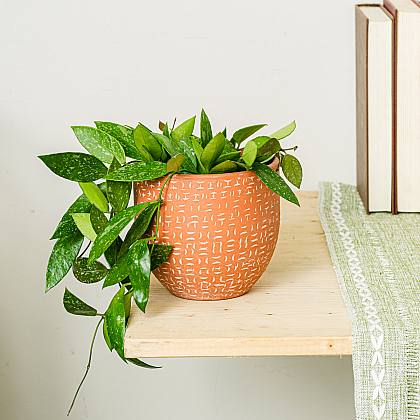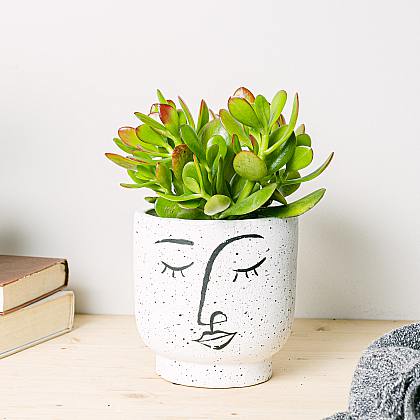Plants for small kitchens: find the perfect one
Would you like to have plants in your kitchen, but don't know what the best options are for small spaces? Don't worry, you've come to the right place. In this...
Would you like to have plants in your kitchen, but don't know what the best options are for small spaces? Don't worry, you've come to the right place. In this article, you'll discover the best houseplants for small kitchens. Plants are a great option for adding a natural, fresh touch to any space, and the kitchen is no exception. In addition, many plants have benefits that go beyond aesthetics, such as purifying the air and reducing stress. Read on to learn about the different plant options to suit your kitchen's needs and some helpful tips for keeping them healthy.
Benefits of Having Plants in the Kitchen
Having plants in the kitchen can bring a number of both aesthetic and practical benefits. First of all, plants add life and color to this space, creating a more welcoming and pleasant atmosphere. In addition, they help purify the air by absorbing carbon dioxide and releasing oxygen, which improves air quality in the kitchen. They can also act as natural filters by absorbing toxic substances present in the environment, such as formaldehyde or benzene, which are commonly found in cleaning products and building materials. Another advantage is that some plants can help control humidity in the kitchen, especially in small, poorly ventilated spaces. In addition to these benefits, plants can also have a positive effect on our emotional and mental well-being. Studies have shown that being close to nature can reduce stress and improve mood. Therefore, having plants in the kitchen not only gives us visual beauty and cleaner air, but it can also contribute to creating a more relaxing and harmonious environment as we prepare our daily meals.
Plants that don't require a lot of space
If you have a small kitchen but still want to have plants in it, don't worry, there are several plant options that don't require a lot of space. One of them is the Christmas cactus, also known as Schlumbergera. This plant is ideal for tight spaces as it grows sideways and can be hung in pots or baskets. Another option is succulents, such as aloe vera or jade plant. These plants are compact and don't need too much space to grow. You can also consider aerial plants, such as Tillandsias. These plants don't need soil and can be placed in hanging pots or decorative containers on the wall. If you prefer something more traditional, you can opt for small herbs such as rosemary, thyme, or basil. These plants are easy to care for and can be grown in small pots. Remember to choose plants that adapt to the conditions in your kitchen, such as the amount of natural light available and the humidity of the environment. With these space-saving plant options, you'll be able to enjoy the beauty and freshness of nature even in a small kitchen.
Aromatic plants for a kitchen with the scent of home
Aromatic plants are an excellent choice for those looking to have a pleasant, fresh aroma in their kitchen. In addition to being decorative, these plants can be used to flavor your meals. One of the most popular plants is rosemary, which in addition to having a delicious aroma, is easy to care for and can be used in a variety of dishes, from chicken to roasted vegetables. Another popular aromatic plant is basil, which is well suited to sunny, warm kitchens. This plant can be used in a variety of Italian dishes, such as pastas and pizzas. Thyme is another aromatic plant that is easy to care for and can be used in dishes with meat or roasted vegetables. Oregano is also a good choice for those looking to add flavor to their meals, especially in Mexican or Mediterranean dishes. In addition to these examples, there are many other options for adding aroma to your kitchen, such as mint, cilantro, and parsley. Not only do these plants add a fresh, natural scent to your home, but they can also help reduce stress and improve your mood. In short, aromatic plants are a great choice for those looking to add a fresh and delicious twist to their kitchen while enjoying the mental health benefits these plants provide.
Edible Plants for Fresh and Natural Cooking
Edible plants are a great option to have in the kitchen, as they not only add beauty and freshness to the space, but also give us the possibility to cook with natural ingredients and full of flavor. In a small kitchen, it's important to make the most of the available space, and what better way to do that than by growing our own herbs and vegetables. Some edible plants that are ideal for small kitchens are cilantro, parsley, basil, and thyme. These herbs are easy to grow in pots or planters, take up little space and can add a special touch to our dishes. In addition, having edible plants in the kitchen allows us to harvest the fresh ingredients just before using them, which guarantees a more intense flavor and higher nutritional quality in our preparations. Likewise, growing our own edible plants helps us reduce the use of chemicals and pesticides, as we can opt for organic methods of cultivation. In short, having edible plants in the kitchen gives us the opportunity to cook in a fresh and natural way, adding a touch of authenticity and health to our dishes.
Succulents for a Minimalist Kitchen
Succulents are a great choice for decorating a minimalist kitchen. These plants are known for their ability to store water in their leaves, making them ideal for dry, low-humidity environments such as kitchens. In addition to their aesthetic beauty, succulent plants require very little maintenance, making them the perfect choice for those looking for a touch of green in their hassle-free kitchen. You can opt for small pots of succulents strategically placed on shelves or tables in the kitchen, or even on the windowsill. Some popular varieties of succulent plants include aloe vera, cacti, and succulents. Not only will these plants add a touch of nature to your minimalist kitchen, but they can also purify the air by absorbing toxins and releasing fresh oxygen. Remember to place your succulent plants in a sunny spot but avoid direct exposure to strong sunlight for long periods of time, as this can damage their leaves. Also, water your succulents sparingly, allowing the soil to dry out between waterings to prevent excess moisture. With these simple precautions, you'll be able to enjoy beautiful succulents in your minimalist kitchen without the hassle.
Hanging plants to take advantage of vertical space
Hanging plants are a great option to take advantage of vertical space in small kitchens. Not only do these plants add a decorative touch, but they also help purify the air and create a fresher, healthier environment. By hanging plants from the ceiling or a high mantelpiece, you can maximize the available space in the kitchen without taking up work surfaces or shelves. In addition, hanging plants create a sense of spaciousness and verticality, which is especially beneficial in tight spaces. Some popular hanging plant options include English ivy, spider plant, hanging ferns, and tradescantia. These plants are hardy and don't require a lot of maintenance, making them ideal for those who have no prior gardening experience. To properly care for hanging plants in the kitchen, it's important to make sure they get the right amount of indirect natural light and water them regularly but not excessively. In addition, it is recommended to fertilize them every two months to ensure their healthy growth. With these hanging plants, any small kitchen can become a green and cozy space.
Tips for taking care of your plants in the kitchen
Taking care of plants in the kitchen is not a difficult task if you follow a few tips. First of all, it's important to choose the right plant for the available space and light conditions. Some plants need more light than others, so it's important to place them in a spot where they'll get the right amount of sunlight. It is also necessary to water the plants regularly, but without overdoing it. It's best to water them when the soil is dry to the touch, as overwatering can lead to root rot. In addition, it is important to provide good drainage to prevent water accumulation at the bottom of the pots.
Another important tip is to keep your plants clean and dust-free. This can be done with a damp cloth or by gently spraying with water. It's also important to control pests and diseases, as they can spread quickly in a hot, humid environment like a kitchen. It is recommended to check the plants regularly and treat any problems immediately.
Finally, it's important to note that some plants can be toxic to children and pets, so it's advisable to do your research before buying a new plant. With these simple tips, anyone can enjoy beautiful plants in their kitchen and take advantage of their aesthetic and health benefits.
Houseplants are a great way to add life and color to any space, and the kitchen is no exception. In addition to being decorative, plants can improve air quality, provide a fresh, natural scent, and be useful in the kitchen. Whether you have a small or large kitchen, there's a plant that's perfect for you. From succulents to hanging plants, there are a variety of options to choose from. When considering which plant to add to your kitchen, think about your needs and available space. Don't forget to follow the tips to take care of your plants properly and enjoy their benefits for a long time. Ultimately, having plants in the kitchen can be an easy and affordable way to make your home cozier and healthier. What are you waiting for to add a plant to your kitchen?


